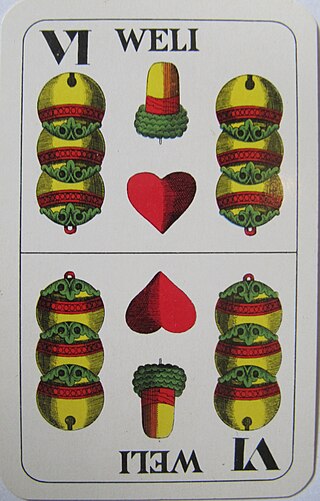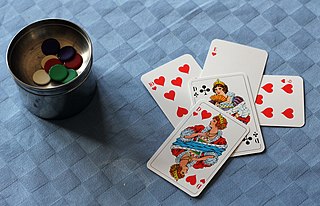
Skitgubbe, and also called Mas, Mjölis, Mjölnarmatte, or Flurst, is a popular Swedish card game that is rated as one of the best for three players. It has two phases: in the first, players accumulate cards; in the second players aim to discard the accumulated hand. The last player to go out is the skitgubbe. Sometimes, the skitgubbe must make a goat noise.
Marjapussi is a traditional Finnish trick taking game for 4 players playing in 2 partnerships and is one of the Mariage family, its key feature being that the trump suit is determined in the middle of the play by declaring a marriage. There are variants of Marjapussi for two and three players.

Brisca is a popular Spanish card game played by two teams of two with a 40-card Spanish-suited pack or two teams of three using a 48-card pack.

Rams is a European trick-taking card game related to Nap and Loo, and may be played by any number of persons not exceeding nine, although five or seven make a good game. In Belgium and France, the game of Rams is also spelt Rammes or Rems, in Germany, Rams, Rammes, Ramsch, Ramschen, Ramscheln or Ramsen, in Austria, Ramsen and Ramschen, and, in America, Rounce. The basic idea is fairly constant, but scoring systems vary. It was a widespread European gambling and drinking game that is still popular today. During the 19th century, it was introduced as Rounce in America and played with a 52-card deck without any difference between simples and doubles and with no General Rounce announcement. In the modern German variety of the game, Ramscheln, the 7♦ is the second best trump ranking next below the ace.
Ramsch, formerly also called Mike in East Germany, is a card game based on the contract of the same name in the popular German card games, Skat and Schafkopf. However, thanks to its interesting mode of play it has since developed into an independent game in its own right which is only loosely based on Skat or Schafkopf. It should not be confused with the games of the Rams family – Ramsen and Ramscheln – that also go by the name Ramsch.

Bohemian Watten, sometimes called Bohemian Ramsen, is a trick-taking card game for two to four players. The biggest differences compared with standard Watten are rules of play such as following suit, the manner in which trumps are determined, there are no Strikers, no teams and, consequently, no signalling. In fact, Bohemian Watten bears more resemblance to Zwanzig ab, Ramsen and Schnalzen than Watten itself.

Blattla is a Bavarian card game for four players, who usually form two teams of two for each deal. It is a simplified version of Schafkopf and Bierkopf and is thus a point-trick game. Unlike those two games, in Blattla the Obers and Unters are not permanent trumps. In order to learn the rules of Schafkopf, it can be an advantage to first become familiar with Blattla. The game is traditionally played with Bavarian pattern cards.

Ramsen or Ramsch is a traditional Bavarian plain-trick, card game for three to five players that is played with a 32-card German-suited pack and is suitable both for adults and for children. It is one of the Rams group of card games that are distinguished by allowing players to drop out if they think they will fail to win the required number of tricks. An unusual feature of Ramsen is the presence of four permanent trump cards that rank just below the Trump Sow (Ace). It should not be confused with the contract of Ramsch in games like Skat or Schafkopf, nor with the related game of Rams which is also called Ramsenin Austria, but is played with a Piquet pack, does not have permanent trumps and has a different card ranking.

Mistigri, historically Pamphile, is an old, French, trick-taking card game for three or four players that has elements reminiscent of poker. It is a member of the Rams family of games and, although it is a gambling game, often played for small stakes, it is also suitable as a party game or as a family game with children from the age of 12 upwards.

Mulatschak or Fuchzenawa is an Austrian card game for two to five players that comes from the Salzburg area and is considered the quintessential game of the region. Although Mulatschak has been called the national card game of Salzburg, its rules were almost certainly unpublished before 2004. Mulatschak is a member of the Rams family in which the key feature is that players may choose to drop out of the game if they believe their hand is not strong enough to take a minimum number of tricks. There is a variant known as Murln or Murlen, which is played in Vienna and the Styria.

Kratzen is an Austrian card game for three to six players that is played for small stakes usually using a 33-card William Tell pack. It is a member of the Rams group of card games characterised by allowing players to drop out of the current game if they think they will be unable to win any tricks or a minimum number of tricks. The game is related to the Swiss Jass form, Chratze and has been described as "fun" to play.
Zwanzig ab, 20 ab or simply Zwanzig is card game for four players. It is a member of the Rams family in which the key feature is that players may choose to drop out of the game if they believe their hand is not strong enough to take a minimum number of tricks. It appears to be a recent, internet-propagated variant of Schnalzen or Bohemian Watten. However, the latter has a natural card ranking, is played with double German cards and a Weli, has no exchanging and has a different scoring system. It is suitable for children from 8 upwards. It may be related from Fünf dazu! which is a simpler game described by Gööck in 1967 that has neither trumps nor the option to drop out.
Juckerspiel, also known as Jucker or Juckern, is a card game that was popular in the Alsace region. It is believed to be the ancestor of Euchre and may have given its name to the playing card known as the Joker.

Norseman's Knock or Norrlandsknack is a classic Swedish card game for 3 to 5 players, known since the mid-1800s. It is traditionally played for money. The game is about winning as many tricks as possible and above all not being completely left without a trick.

Trekort, Tre-Kort or, in Swedish, also Trikort, is an old card game of Danish origin for four or five players that was usually played for money. It was also known in Sweden, where it developed into the variant of Knack. The name Trekort is also loosely used to describe related three-card games such as Swedish Köpknack. The name means "three cards" and may therefore be related to German Dreiblatt.

Köpknack is an old Swedish card game which is a development of Knack and, like the latter, is mainly played for stakes. The game is also known as Trekort which, however, usually refers to a simpler version of Danish origin that may have been its progenitor.

Femkort is a classic Swedish card game for 3 to 8 players "with an unusual object", known since the 17th century, being mentioned in 1658 in Georg Stiernhielm's epic poem, Hercules (Herkules) as Fämkort. It is traditionally played with some kind of bet.
Swedish whist, also called Fyrmanswhist or, regionally, just whist, is a Swedish trick-taking, card game. Knowing four-player whist is useful for playing other card games because it was the prototype for trick-taking games.

Call-ace Whist or Danish Whist is a card game for four players playing in variable partnerships. It is the most popular form of Whist in Denmark, where it is often just called "Whist". It has a well developed bidding system and has imported from the traditional Danish game of Skærvindsel the feature of determining the partnerships by 'calling an ace'. John McLeod records that there is also a version of Danish Whist in which there are fixed partnerships.

Sjavs is a Danish card game of the Schafkopf family that is played in two main variants. In Denmark, it is a 3-player game, played with a shortened pack of 20 cards; in the Faroe Islands, where it is very popular, it is a four-hand, partnership game using a standard Piquet pack of 32 cards.












